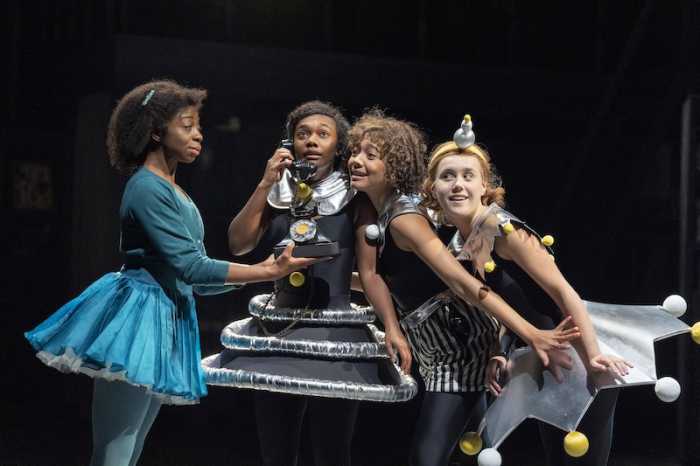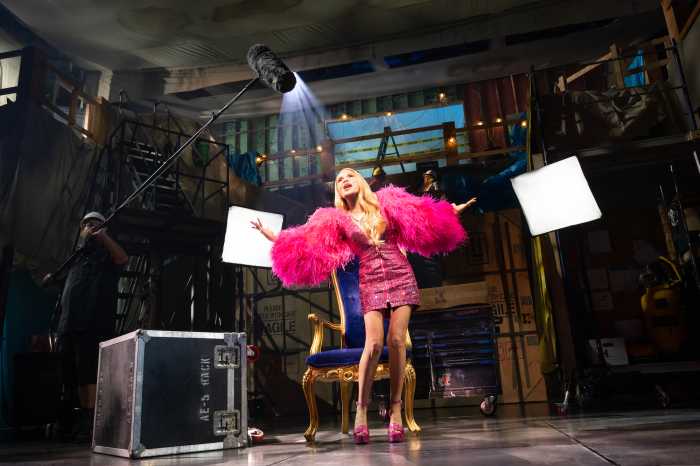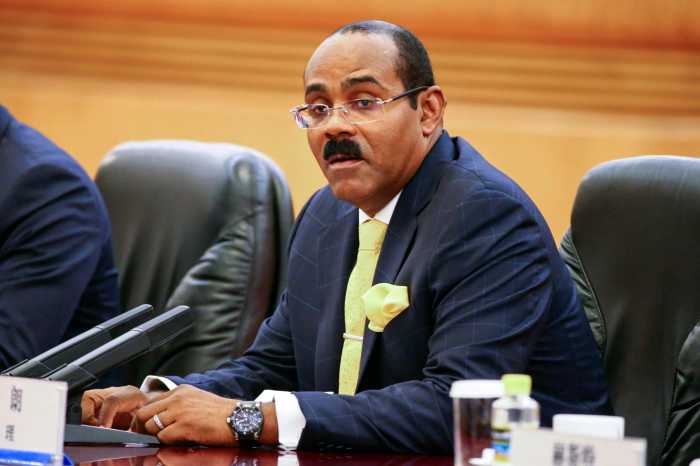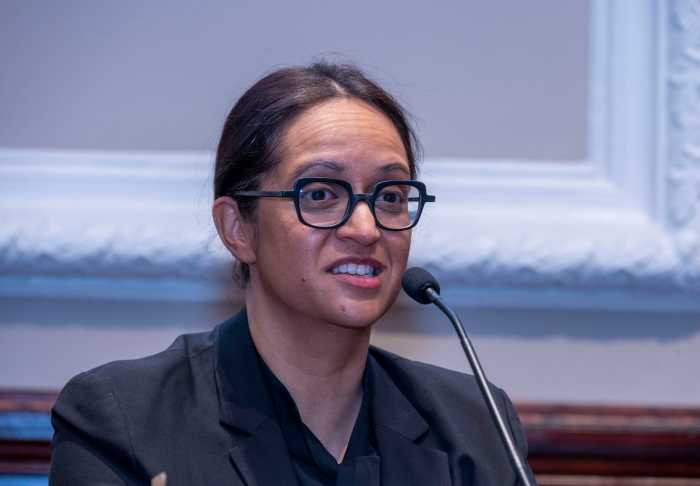I had a week of theater in London with a very high body count — from civilian victims of terrorism and war to post-war suicides to lives wrecked by infidelity. I saw one masterpiece, the world premiere of a 90-year-old gay-themed play, a joyful salute to a teen drag queen, and some well-intentioned misses.
The improbable masterpiece is about the rise and spectacular fall of Lehman Brothers, the behemoth firm that was not too big to fail in the financial meltdown of 2008. “The Lehman Trilogy” at the National’s Olivier (to October 20) is directed by Sam Mendes and stars Simon Russell Beale, Ben Miles, and Adam Godley. It is a theatrical miracle — a 2013 play by Italian Stefano Massini that has been adapted by Ben Power and his creative team into an epic tale of family and the overgrowth of capitalism in which these three brilliant actors take on all the roles from the three German Jewish brothers who emigrate to Alabama before the Civil War to their descendants — wives and even little children — to the supporting players in their enterprise. It is a model of engaging storytelling that we who are financially illiterate and even children can enjoy.
I never thought I would live to see the day when I would join in a standing ovation for a show about proto-capitalists who forged their empire on slave-picked cotton (becoming something new: “middle men”) and whose firm’s greed contributed mightily to the collapse of the world economy that brought misery to millions. There is a lot of less egregious investment in between — financing everything from the railroads and the Panama Canal to movies such as “King Kong.” They shaped our society by moving it to a consumer culture where “to buy is to exist.” But when they stopped funding innovation and just used money to make obscene amounts of more money, the die was cast. It all plays out ingeniously in their New York office at the time of the crash without the men changing their 1840s outfits.
When I asked the actors at a talk-back platform the day after seeing it if they had a sense of foreboding doing this play given that financial regulation is once again being done away with, Miles said, “We’re all living in Act IV of this play.” Here’s hoping he and his brother actors have the stamina to bring the play to New York, the scene of Lehman’s flowering and demise.

In 1929, Robert Graves (1895-1985), later famous for the novel “I, Claudius,” wrote “Goodbye to All That,” a successful World War I memoir. Maurice Browne, who produced the hit play “Journey’s End” about life in the trenches, asked Graves to write a war play. Graves penned “But It Still Goes On” about the after-effects of the war, but incorporated primary characters who were gay and lesbian and trying to survive in a world that demanded heterosexual marriage of them. Graves was told by Browne that if he produced the play, Graves’ career would be over. Indeed, given anti-gay censorship in England that lasted into the 1960s, it is hard to see how it could have been staged in ’29. The Finborough pub theater is giving it its world premiere (to August 4 only — unfortunately).
While the central character, World War I vet Dick Tompion (Alan Cox in top form) is a cynical heterosexual character given to searing and sometimes humorous tirades about the futility of life and love, his best friend, David Cassells (stoic Victor Gardener), is a handsome gay man out to marry Tompion’s doctor sister (prim Rachel Pickup), whose close friend Charlotte (sultry Sophie Ward) is a lesbian who wants to marry Dick in order to fit into an anti-gay society. The discussions of sexual identity are way ahead of their time. The melodramatic final scenes — including gay and non-gay suicides and an anti-gay murder — are not in keeping with the more sophisticated tone of most of the play directed by Fidelis Morgan, but perhaps Graves felt he had to make his characters pay for breaking norms in order to give it any chance of being produced. Still, homosexuality is treated with much more sensitivity than Lillian Hellman’s 1934 “Children’s Hour” and beat “The Boys in the Band” in breaking gay ground by 40 years.
On a lighter and more heartening note, the musical “Everybody’s Talking About Jamie,” based on the true story of a gay boy from the Midlands set on being a drag queen, including at his prom, is packing them in at the Apollo (to October 6) and is set to be a motion picture. Written by Dan Gillespie Sells and Tom MacRae and directed by Jonathan Buterell, it’s “Billy Elliot” meets “Kinky Boots” as sassy Jamie New (John McCrea) navigates high school with the support of his bookish Muslim friend Pritti Pasha (Lucie Shorthouse) and working-class mum (Rebecca McKinnis), despite a scolding teacher and a dad who has blocked him.
There is lively choreography from Kristie Skivington and an intimate design from Anna Fleischle that lets Jamie sparkle in his drab Sheffield school and home. Most impressive is the way middle England has taken to the show’s theme of daring to be different, rocking out to the beat of a gender non-conforming kid.

All honor to the Royal Court Theatre for its dedication to new and timely plays, even if the current offerings are less than successful. “One For Sorrow” by Cordelia Lynn, in its smaller house (to August 11), imagines an upper middle class family in London coping not just with a terrorist attack outside their doors but what happens when a stranger who is just as British but Muslim is given a place to hole up with them until the crisis passes. It’s an intriguing set-up that has its moments as when the visitor, John (Irfan Shamji), responds to the concern of the college-age daughter (Sarah Woodward) that trauma should not be normalized by saying, “Sometimes I think it’s stranger that we’ve got used to this way of living… Eating all the time, intoxicated all the time, television all the time.”
John is the most interesting character amid liberal stereotypes who are not coping well. The pacing by James Macdonald, who gave us the absorbing “The Children” on Broadway last season, could be picked up.
The war comes home to a British market town in Rory Mullarkey’s “Pity” at the Royal Court’s big house (to August 11) directed by Sam Pritchard. As the town is assaulted Mosul-style, the troupe of actors play it as a cross between a children’s farce and a music hall romp that worked so well in “Oh, What a Lovely War.” But “Pity” is silly without being trenchant and, as such, unmoving. Perhaps it a just revenge on us in the West for our genocidal wars on peoples of the Middle East.
Also missing the mark is Polly Stenham’s version of Strindberg’s 130-year old “Miss Julie.” “Julie,” directed by Carrie Cracknell at the National’s Lyttleton (to September 8), sets the play today, when there is infinitely less drama over a spoiled rich girl (Vanessa Kirby who was Princess Margaret in “The Crown” series, though I saw her understudy Francesca Knight) trying to make it with her rich dad’s chauffeur, Jean (Eric Kofi Abrefa). Not only is there no one to care about in this pair, there is no big principle at stake in 2018. Thalissa Teixeira generates some sympathy as Kristina, the betrothed of Jean and servant of Julie, but that’s not enough to redeem this well-acted but empty production. You can, however, judge for yourself as it is transmitted to theaters starting Sept. 6 via NTLive.

Much better is Patrick Marber’s new version of Eugène Ionesco’s 1962 “Exit The King” (to October 6), an intimate absurdist play about a dying 483-year-old king that is being given a grand production at the National’s big Olivier space. King Bérenger is played with panache by Rhys Ifans and supported by the formidable Indira Varma as Queen Maruerite and the always amusing Adrian Scarborough as the king’s doctor.
The king is so arbitrary and capricious that he is tough to root for — despite his considerable age. It is hard not to be reminded of our even more oafish and malevolent chief executive as the king’s enemies close in on his besieged and dwindling court, though Ifans has said his character has nothing to do with Trump. What we are keenly aware of, though, is that good as this production is it has a tough time competing with the tragicomic absurdity of what we are now living through here in the US.
“Consent” by Nina Raine is at the Harold Pinter Theatre to August 11. What starts as a domestic drama involving friends on opposite sides of a rape case descends into bitter marital confrontations over fidelity and other values. Stephen Campbell Moore, the younger teacher in “The History Boys,” shines as Edward, a barrister good at defending indefensible clients but less capable when it comes to steering his own marriage through troubled water. Roger Michell’s pacing is bracing, but I’m not sure it is the kind of play to bring a partner to unless you’re very secure.
Also On, Coming Up & Being Telecast: Out gay “national treasure” Alan Bennett is back with “Allelujah!” about a National Health Service home directed by Nick Hytner at his new Bridge Theatre (to September 29)… Bennett’s “The Madness of George III” will be transmitted to theaters starting November 20… “The Jungle,” about refugees in Calais, transferred from the National to the Playhouse Theatre (to November 3) and is a critical hit… Out gay Ian McKellen is also a hit in “King Lear” at the Duke of York’s to November 3 and telecast from September 27… “Antony & Cleopatra” with Ralph Fiennes and Sophie Okonedo is on from September 18 to December 31 and telecast from December 6… Mark Rylance is doing Iago at the Shakespeare’s Globe in “Othello” (to October 13)… David Hare’s new “I’m Not Running” is at the Lyttleton (October 2 to January 31) and on NTLive from January 31… Peter Brook and Marie-Hélène Estienne’s “The Prisoner” is at the National’s Dorfman September 12 to October 4.





































